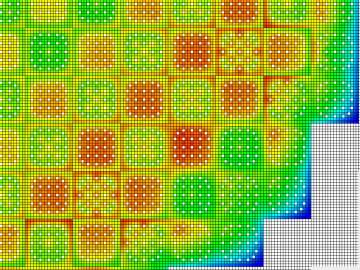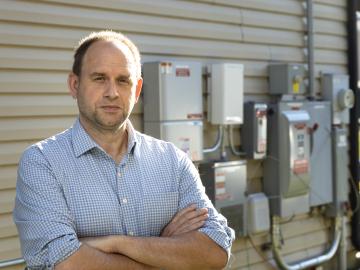
Filter News
Area of Research
- Advanced Manufacturing (1)
- Biology and Environment (23)
- Computational Biology (1)
- Computational Engineering (1)
- Computer Science (4)
- Energy Science (23)
- Fusion and Fission (6)
- Fusion Energy (7)
- Materials (9)
- Materials for Computing (3)
- National Security (9)
- Neutron Science (12)
- Nuclear Science and Technology (12)
- Nuclear Systems Modeling, Simulation and Validation (1)
- Supercomputing (33)
News Topics
- (-) Advanced Reactors (40)
- (-) Big Data (79)
- (-) Coronavirus (48)
- 3-D Printing/Advanced Manufacturing (147)
- Artificial Intelligence (131)
- Bioenergy (112)
- Biology (128)
- Biomedical (73)
- Biotechnology (39)
- Buildings (74)
- Chemical Sciences (86)
- Clean Water (33)
- Composites (35)
- Computer Science (226)
- Critical Materials (29)
- Cybersecurity (35)
- Education (5)
- Element Discovery (1)
- Emergency (4)
- Energy Storage (114)
- Environment (218)
- Exascale Computing (67)
- Fossil Energy (8)
- Frontier (64)
- Fusion (67)
- Grid (74)
- High-Performance Computing (130)
- Hydropower (12)
- Irradiation (3)
- Isotopes (62)
- ITER (9)
- Machine Learning (68)
- Materials (157)
- Materials Science (158)
- Mathematics (12)
- Mercury (12)
- Microelectronics (4)
- Microscopy (56)
- Molten Salt (10)
- Nanotechnology (64)
- National Security (86)
- Neutron Science (171)
- Nuclear Energy (122)
- Partnerships (68)
- Physics (69)
- Polymers (35)
- Quantum Computing (53)
- Quantum Science (93)
- Security (31)
- Simulation (65)
- Software (1)
- Space Exploration (26)
- Statistics (4)
- Summit (71)
- Transportation (103)
Media Contacts

Experts at the Department of Energy’s Oak Ridge National Laboratory are now offering short-term technical and scientific assistance to entities working to combat the coronavirus through the COVID-19 Technical Assistance Program, an initiative of DOE’s Office of Technology Transitions.

A developing method to gauge the occurrence of a nuclear reactor anomaly has the potential to save millions of dollars.

As CASL ends and transitions to VERA Users Group, ORNL looks at the history of the program and its impact on the nuclear industry.

Oak Ridge National Laboratory researchers have developed a machine learning model that could help predict the impact pandemics such as COVID-19 have on fuel demand in the United States.

Combining expertise in physics, applied math and computing, Oak Ridge National Laboratory scientists are expanding the possibilities for simulating electromagnetic fields that underpin phenomena in materials design and telecommunications.

Joe Hagerman, ORNL research lead for buildings integration and controls, understands the impact building technology innovations can have during times of crisis. Over a decade ago, he found himself in the middle of one of the most devastating natural disasters of the century, Hurricane Katrina.

A team led by Dan Jacobson of Oak Ridge National Laboratory used the Summit supercomputer at ORNL to analyze genes from cells in the lung fluid of nine COVID-19 patients compared with 40 control patients.

From materials science and earth system modeling to quantum information science and cybersecurity, experts in many fields run simulations and conduct experiments to collect the abundance of data necessary for scientific progress.

Ada Sedova’s journey to Oak Ridge National Laboratory has taken her on the path from pre-med studies in college to an accelerated graduate career in mathematics and biophysics and now to the intersection of computational science and biology

A team of researchers has performed the first room-temperature X-ray measurements on the SARS-CoV-2 main protease — the enzyme that enables the virus to reproduce.


